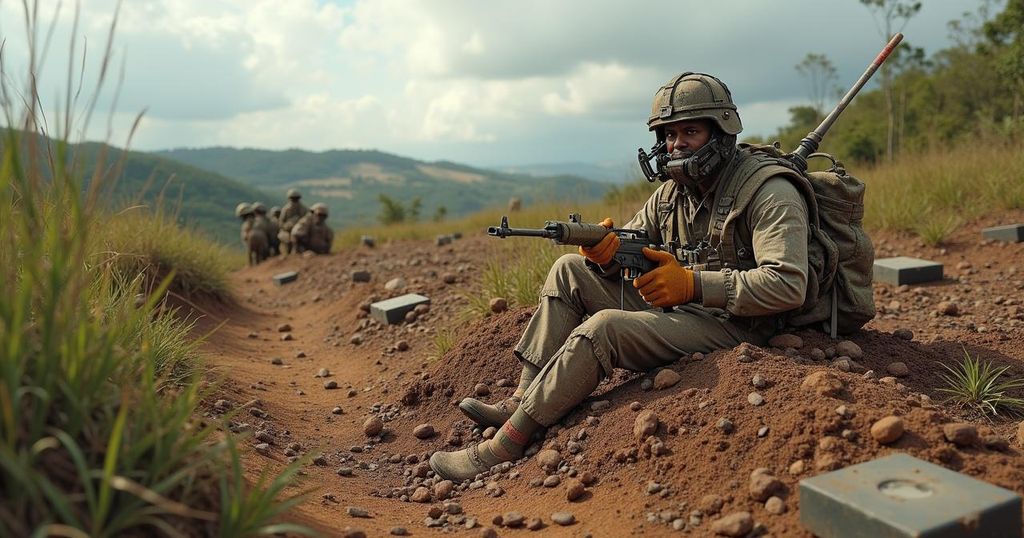The Lingering Legacy of Landmines in Colombia and Angola
This article explores the enduring scourge of landmines in Colombia and Angola, stemming from decades of conflict, particularly emphasizing the humanitarian and developmental impacts. The challenges of demining efforts in both nations underline the crucial need for ongoing international support as well as tighter arms control regulations to prevent future tragedies.
In Colombia, the unsettling sound of landmine explosions has permeated the lives of its citizens, particularly in Bogotá. Although this capital city is distanced from the historical battlefields of the past, the omnipresent threat of landmines lingers in the national psyche. This reality is a haunting reminder of Colombia’s enduring internal conflict that has spanned over six decades, primarily involving various guerrilla factions, notably the Revolutionary Armed Forces of Colombia (FARC). Rural regions in Colombia have borne the brunt of this lingering conflict, with thousands of landmines clandestinely planted across villages, agricultural lands, and forested areas. These mines were often deployed without adequate maps or documentation, rendering vast areas perilous and uninhabitable. While Colombia has made strides in de-mining initiatives, the human cost remains evident, manifesting in the form of amputations and loss of life. Despite international agreements such as the Ottawa Treaty, which aims to prohibit the use of anti-personnel landmines, Colombia is not alone in facing the repercussions of landmine pollution. Similarly, Angola is noted as one of the heaviest mined nations globally, grappling with over 73 million square meters of land contaminated by landmines, alongside more than 1,100 known or suspected minefields. Like Colombia, Angola’s de-mining efforts have faced obstructions, primarily due to inadequate funding and the enormity of the task at hand. The repercussions of landmines extend beyond immediate human casualties, significantly impacting the agricultural and economic advancement of both countries. In Angola, landmines—leftovers from its war for independence from Portugal and subsequent civil strife—impede livelihoods and agriculture. In Colombia, landmines obstruct rural growth by making it hazardous for families to safely return to their homes or cultivate their lands. The lengthy and costly de-mining procedures are heavily reliant on international aid and contributions from benevolent organizations. A lack of sustained global engagement could render the ambition of achieving a landmine-free environment an unattainable goal. In Angola, for instance, international financial assistance for demining dropped dramatically by over 80% from 2005 to 2017, compounding the country’s internal funding difficulties exacerbated by declining prices of key export products. Initially, Angola’s government aimed to complete its demining efforts by December 2013, adhering to the requirements of the Ottawa Treaty. However, this deadline has been extended to 2028, reflecting the dilemma of the urgent yet complex challenge of demining. Colombia’s situation parallels that of Angola, as both nations grapple with the daunting task of removing landmines from their territories. Continued international support is essential for both areas to meet their respective demining objectives. The inadequacies of arms control measures to avert human tragedies highlight the critical need for enhanced regulations and collaborations on a global scale. The international community must tighten its governance of arms trading, lest the harmful effects of these destructive devices persist and devastate lives for generations to come.
This article addresses the severe impact of landmines in Colombia and Angola, two nations afflicted by internal conflicts that have left a lasting legacy of unexploded ordnance. Both countries have experienced lengthy and complex civil strife, leading to widespread landmines that continue to pose threats to civilian populations and impede economic development. Despite international efforts to address the landmine issue, progress has been slow and inadequate, compounded by financial constraints and the sheer scale of the demining challenges. This situation underscores the need for ongoing international support to achieve landmine clearance and highlight the ethical responsibilities surrounding arms regulation.
In summary, the legacy of landmines represents a significant humanitarian and developmental concern for Colombia and Angola. The challenges posed by these remnants of conflict persist, impeding economic growth and resulting in grave humanitarian consequences. While international treaties advocate for the eradication of landmines, tangible progress is hindered by funding shortages and the overwhelming extent of the contamination. Without sustained global attention and cooperation, the path to a landmine-free future appears daunting.
Original Source: punchng.com




Post Comment